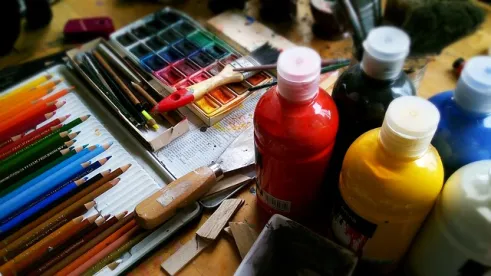UNITED STATES
Proposed Copyright Legislation Meant to Streamline Dispute Resolution Faces Criticism
While several pieces of copyright legislation are expected to come before the U.S. Congress this year, arguably the most significant is the Copyright Alternative in Small-Claims Enforcement (CASE) Act.
The Act is intended to benefit artists, for whom copyright enforcement litigation is often cost-prohibitive. CASE would establish a small-claims court system made up of a three-judge board to adjudicate claims up to $15,000 for a single infringed work with a maximum allowed total of $30,000. The system would be akin to mediation. It requires the consent of each party to proceed and allows defendants to opt out within 60 days. One legal expert argues that the opt-out provision still favors the infringers, who “know that, if they opt out, the artist won’t be able to pursue it in regular court.” Another expert opines that the system will create additional problems by allowing “big content owners and copyright trolls … to go after individuals for smaller-scale alleged infringements that wouldn’t be worth pursuing in federal court, but may be worth a shot in this new small claims forum.”
Additional bills before Congress include the American Royalties Too (ART) Act, which could establish resale royalty rights for artists on the secondary market (i.e., a right of an artist to a percentage of the resale price of the artwork), and the Artist Museum Partnership Act, which could allow artists increased tax benefits for donating their works to public institutions.
-
The Art Newspaper: U.S. Copyright Law Comes under Scrutiny as New Legislation Makes Its Way before Congress
Federal Court Rules LeBron James and other NBA Players Have Nonexclusive Licenses to Use Tattoos as Part of Their Likenesses in Lawsuit Against Video Game Developers
In a landmark copyright lawsuit filed by a tattoo company against video game developers, the U.S. District Court for the Southern District of New York granted summary judgment in favor of video game developers who created a basketball simulation video game depicting NBA teams and realistic likenesses of the players, including their tattoos. The court found that because only three likenesses (LeBron James, Eric Bledsoe and Kenyon Martin) out of 400 displayed the replicated designs, which were less than one tenth the size of the actual tattoos, the use of the tattoos was de minimis and amounted to fair use. The court also found that the players possessed implied licenses to use the tattoos as part of their likenesses. While not binding on other courts, the decision could impact the several pending lawsuits concerning tattoos in video games.
U.S. Supreme Court Resolves Conflict Between Copyright Remedy Clarification Act and 11th Amendment
A North Carolina independent film producer and director sued the state of North Carolina for using still images and video from his 1990s filming of the salvaging of the pirate Blackbeard’s flagship, Queen Anne’s Revenge. The lawsuit challenged a 2015 state law treating all documentary material of shipwrecks and derelict vessels as “public record.” The U.S. Supreme Court upheld the North Carolina law and ruled that state governments can use copyrighted images without permission under the doctrine of sovereign immunity. The high court also resolved a conflict between the federal Copyright Remedy Clarification Act (1990), which opened up state governments to copyright infringement lawsuits, and the 11th Amendment to the U.S. Constitution, which restricts private citizens from suing states. In an opinion authored by Justice Kagan, the Court instructed Congress to pass a new law tailored to stop states from behaving as copyright pirates.
-
The Art Newspaper: Supreme Court Rules Film Maker Cannot Sue North Carolina for Copyright Infringement
New York Art Galleries to Pursue State Government Rent Relief Amid State-Mandated Shutdowns Due to Coronavirus
The New York state government mandated that all nonessential businesses remain closed as part of an effort to slow the spread of the coronavirus. The unexpected closures caused financial stress and uncertainty for all New York galleries, but especially small galleries that are unable to generate income and lack savings to pay their rent. Governor Andrew Cuomo enacted a 90-day mortgage freeze, but only placed a three-month suspension on evictions that still allows property owners to file notices of eviction. When the eviction suspension is lifted, gallery owners fear being faced with insurmountable past-due rent amounts. Legislation that includes rent relief for small businesses and mortgage relief for landlords who cannot collect rent has received support from the city’s mayor, but has yet to receive the same support or recognition from the governor. Most small galleries cannot qualify for relief under the federal stimulus package, even though the package allocates $377 billion for small businesses. Gallery owners are particularly frustrated by the lack of assistance when compared with the government aid galleries in Europe are receiving due to forced shutdowns. If the state does not act soon, many dealers fear they may have no choice but to engage in a “rent strike” to demand action.
-
The Art Newspaper: New York Galleries Seek Rent Relief from State Government in the Wake of Coronavirus Shutdowns
-
Business Insider: New York City Officials Are Urging Gov. Cuomo to Approve an $8 Billion Plan for Rental Relief – after Renters Were Left Out of the Federal Coronavirus Stimulus
Museum Founded by Hobby Lobby President Will Return 11,500 Artifacts to the Middle East
The Museum of the Bible will return 11,500 pieces from its biblical art collection to Iraq and Egypt after facing pressure due to allegations that the pieces were smuggled. The museum was founded by Hobby Lobby President Steve Green in 2017. Green began collecting in 2009 and amassed a collection worth $30 million, the provenance and authenticity of which has faced scrutiny over the years. Hobby Lobby previously returned 5,500 artifacts and paid a fine of $3 million to the U.S. government based on allegations that it imported ancient cuneiform tablets by claiming they were tile samples. The museum previously returned bible fragments that were allegedly stolen from the University of Oxford’s Egypt Exploration Society. Sixteen Dead Sea Scroll fragments that the museum purchased were confirmed to be modern forgeries. Green, who claims his past “mistakes” were due to his lack of knowledge about collecting, has implemented stricter protocols for acquisitions for his personal collection and the museum. Despite these efforts, Green and his Museum of the Bible still face criticism for what experts perceive as irresponsible collecting practices.
Judge Issues Scathing Ruling Against Licenser of Unicorn Products Seeking Reconsideration of a Decision to Delay Hearing on its Motion for Restraining Order During the Coronavirus Crisis
Following the federal court system’s decision to delay a hearing on a licensing company’s motion for a temporary restraining order halting counterfeiters from China from selling items with designs by fantasy artist Anne Stokes, the licensing company sought reconsideration and filed a second emergency motion that drew the ire of a Chicago federal judge. The judge denied not only the motion for reconsideration but also the motion for a temporary restraining order, holding that while trademark infringement is important, it also is “important to keep in perspective the costs and benefits of forcing everyone to drop what they’re doing to stop the sale of knockoff unicorn products in the midst of a pandemic.”
EUROPE
Thieves Steal van Gogh on Artist’s Birthday While Museum Closed Due to the Coronavirus
At 3:25 a.m. on March 30, 2020 – what would have been Vincent van Gogh’s 167th birthday – thieves smashed a glass door and stole The Parsonage Garden at Nuenen in Spring (1884), an oil on paper on panel piece that was on loan from the Groninger Museum to the Singer Laren, a private museum specializing in art from 1880–1950 that houses works from Kees van Dongen and Auguste Rodin. At the time of the theft, the Singer Laren had been closed for several days due to the coronavirus pandemic. Interestingly, authorities have recovered each of the 28 van Goghs stolen in the Netherlands since 1988.
-
The Art Newspaper: Birthday Heist: van Gogh Painting Stolen from Dutch Museum on Anniversary of Artist’s Birth
Swiss Museum Reverses Position and Will Compensate Heirs of Jewish Collector for Works Sold Under Duress of the Nazi Regime
Swiss museum Kunstmuseum Basel purchased 200 works previously owned by Curt Glaser, a Jewish collector and leading Berlin art figure, at auction in 1933. Glaser was the director of Berlin’s city art library until the Nazis rose to power, when he fled to Paris and eventually to the United States. Before he left Berlin, Glaser sold his collection at auction for prices well below market value. The museum previously rejected Glaser heirs’ claims for restitution and maintained it purchased the pieces in good faith. However, the museum reopened its own investigation after the Bern Kunstmuseum attracted attention when it inherited works amassed by Nazi art dealer Hildebrand Gurlitt, as well as following decisions by other museums and private collectors to return other artworks to Glaser’s heirs. Glaser’s collection, which has as estimated value of $2 million and includes works by Matisse, Rodin, Chagall and Munch, was purchased by the museum at “fire-sale prices” according to the subsequently revealed minutes from the museum’s 1933 meetings. The museum and family have plans for a 2022 exhibition honoring Glaser’s accomplishments in the art world.
-
New York Times: Swiss Museum Settles Claim Over Art Trove Acquired in Nazi Era
Drunken Thieves Arrested for Stealing Stones from Notre Dame
France halted its restoration of the Notre Dame Cathedral in Paris, which was heavily damaged in a fire last April, because the anti-lead safety rules observed during the restoration process contradicted the necessary social distancing protocols instituted in the wake of the coronavirus spread. France ultimately enacted a self-confinement order to combat the spread of the virus. On the first evening of self-confinement, police found two drunken men hiding under a tarp at Notre Dame with several stones from the cathedral in their possession. Authorities believe the thieves planned to sell the stones on the black market.
-
The Art Newspaper: Thieves Arrested for Stealing Stones from Notre Dame in Paris




 />i
/>i

